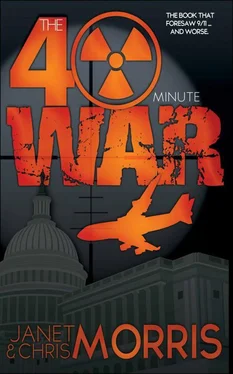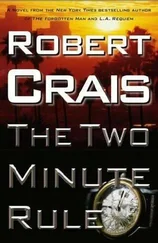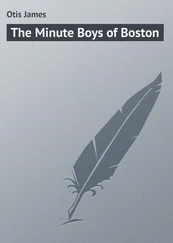“Aw, shit,” Slick whispered as the entire hand came free in Beck’s grasp and he sat back, holding it, face averted, so that he didn’t see the dog, fangs bared, lips curled, come barreling out of the hole.
He first realized what was happening when Slick pushed him out of the way and he sprawled across some jagged brick.
The dog had its teeth in Slick’s wrist and Slick was trying to lift it off the ground and shoot it with his free hand without shooting himself.
Beck’s training reasserted itself: he had the Ingram by its pistol-grip, safety disengaged, the bolt already slamming home before he knew it.
The.45 caliber report was so loud that he could hear it through his helmet. What he couldn’t hear was the howl of the shot and dying dog and the growls of its three compatriots—shepherd mixtures—who were leaping through the window after the leader of the pack.
Beck yelled to Nye to run but Ashmead countered: “Hit the dirt, fool,” and then there was time only to shoot the dog leaping for his throat and roll out from under it, fully aware that Ashmead’s bullets must be whizzing above his head and ricocheting off the rubble.
“Clear,” came Ashmead’s voice in his ears again. “Everybody out of there, now .”
Beck was watching Slick, who was looking at his torn, bleeding wrist and the tatters of radiation suit around it.
“Well, fuck,” said Ashmead’s deputy, “that’s that, I guess.” His breathing was labored.
Tuning out Nye’s sudden burst of hysterical non sequiturs, Beck said, “No—it doesn’t have to be.” He got up and went to Slick, who was staring doubtfully at his freely bleeding wrist. “The blood’s washing it. We’ll get you right back to the chopper and scrub it down, tape the suit…. Worst case, it’ll cut a year off your life, and if you’re going with us into Langley, you ought not to be too worried about that.”
Nye toed one dog: “It’s rabies, not radiation he’s worried about,” Nye said. “You can’t always tell from looking at a dog whether or not it’s rabid.”
Slick retorted: “I’m not worried , Nye; I’m dead on my feet, like Beck says, one way or the other. But come on, let’s go. I want to see you guys safe to Langley—that’s what I’m here for.”
Ashmead had a hand on one hip and his Mac-10 on the other. Even from a distance, Beck could tell he was shaking his head in disgust while he covered their retreat from the building.
When Slick reached him, Ashmead lowered the gun, grabbed Slick’s wrist, and then put an arm around Slick’s shoulders. “After you two.” Ashmead motioned with the weapon in his other hand and his voice was metallic: “Let’s go; on the double.”
Thoreau was already preparing to lift off as they scrambled aboard and Ashmead slammed the slider shut.
Only Nye strapped in. Wordlessly, Beck exchanged his M-10 for the medikit and they went through the motions of scrubbing Slick’s exposed and bitten skin and then taping up the rents in his suit.
Slick, despite his protestations and even logic, looked worried, as white as a sheet.
While Ashmead fussed over Slick with the obsessiveness of a mother, Slick said: “Okay, Beck, maybe now you’ll tell me just what it is in Langley that’s worth all this.” Sweat glittered among the stubble on the deputy’s jaw.
“He can’t…” Nye said.
“He’s got a right to know, Sam,” Beck interrupted, and was shocked to hear his own calm, decisive tone.
“I just meant that he wouldn’t understand it,” Nye said thickly.
“Try me,” Slick challenged.
“We’re going to try to get a message upstairs to Langley—the operational Langley of sixteen days ago: that’s about all we can expect to handle, somewhere in the vicinity of a sixteen-day temporal skew. Nye says they managed a two-week send from computer to computer in the building during test—”
“They’re not cleared for this….”
“Nye, shut up.” Then, to Slick: “The basement computers have gallium arsenide circuitry; that gives us a better chance that they’ll have survived the pulse… that and the fact that they were probably shut down. But there are problems: it’s going to be hot in there. Even if the emergency generators are all working, we won’t be able to spare power for air conditioning, so we’ve got to do it right the first time, before the heat starts affecting the computers and we begin getting garbage or outright equipment failure. Which means lots of sitting around while we get everything up and running and do systems checks in a red zone which is going to read off the scale on that belt Geiger counter of yours. So it doesn’t matter about the dog bite, unless you were going to sit outside in the chopper.”
“I wasn’t,” Slick said easily. “But what about paradoxes—time travel, I mean… What’s going to happen to us if it works?”
“Good question. This isn’t a test signal we’re sending—it’ll change things if it works. Rafic, got a scratchpad?”
Ashmead did and when he handed it to him, Beck saw that Ashmead’s eyes were bright and their lower lids flame-red. Slick was his favorite and bandaging Slick’s wounds had brought ghosts of too many others out where Ashmead had to deal with them. Fighters will tell you that in their occupation they become inured to death, that your first kill is the one that haunts you and all the rest line up faceless behind, but that’s the way it is only with enemies. With friends, and especially with a team like Ashmead’s, losses cut as deep as in any family.
“You might want to see this too, Rafic—it’ll make more sense to you… everything, I mean.”
Nye was glaring at Beck fixedly, as if a security breach could endanger anything at this stage.
Beck was about to say something very hostile to his best friend when Thoreau interrupted, from the flight deck: “I’d really like Rafic up here. Not that I can’t handle this bird single-pilot, but she’s not really built for it.”
Rafic’s heavy features registered something like relief and he left them.
Beck took the scratchpad and began drawing a leafless tree with a thick trunk and many branches, on an axis like cross-hairs. As he drew, he said: “What will happen to us, on site, is most likely terminal overexposure—in this particular future. What we’re going to do is try to create or hook into another future, one in which your team took out the Islamic Jihad who nuked Home Plate before they got out of Saudi Arabia. If it works, some theories suggest that we might not even have time for a long leisurely death.” Beck pointed to the tree trunk and drew a line on the positive axis toward the future that meandered up the trunk and swung left onto a short branch that ended abruptly: “It could be that in a forced, unnatural situation like this, everything we know and are will just… stop. Zero, zilch, zip—end of the world. And, of course, if that son of a bitch Beggs goes ahead with his secondary strike, it might be just as well.”
“Beck!” Nye’s pejorative had a tinge of hopelessness.
“I’m telling you, Sam, it doesn’t matter. CIA suggested that something like this might be possible in order to distract President Beggs from his primary intent: a second strike against the Soviets. Beggs authorized this little adventure, gentlemen, in order to instigate a pre-emptive strike against the Soviets.”
“Shit,” Ashmead’s voice came out of Beck’s helmet.
“But Nye—CIA—and I have an understanding,” Beck continued. “We don’t think there’s a chance in hell we can make something like a pre-emptive strike work, or that it would make any substantive difference if we could—probably the same, or a very similar, time-line to this one would be the result. And that, we agree, is unacceptable.” Beck took his pencil off the abruptly ending branch and tapped another, one a bit longer, which nevertheless dead-ended. “Like this one.” Then he moved the pencil again: “However, we think that if we can stop the terrorists, we we might hook back into a time-line that has a chance of continuing.” With the pencil, he traced a line from the bottom of the tree trunk that went up the main branch and disappeared off the paper: “An open-ended temporal flow, if you like.”
Читать дальше












